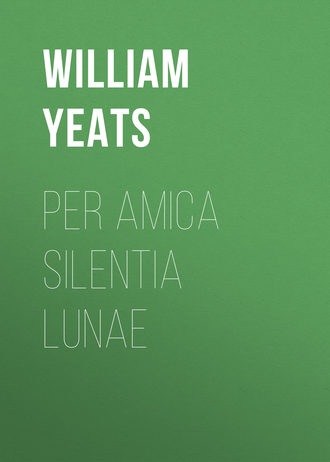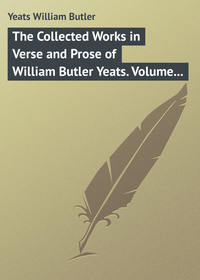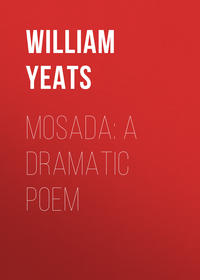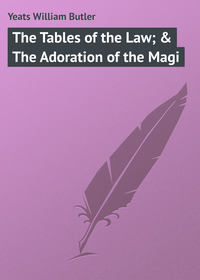 полная версия
полная версияPer Amica Silentia Lunae
It is not permitted to a man, who takes up pen or chisel, to seek originality, for passion is his only business, and he cannot but mould or sing after a new fashion because no disaster is like another. He is like those phantom lovers in the Japanese play who, compelled to wander side by side and never mingle, cry: “We neither wake nor sleep and passing our nights in a sorrow which is in the end a vision, what are these scenes of spring to us?” If when we have found a mask we fancy that it will not match our mood till we have touched with gold the cheek, we do it furtively, and only where the oaks of Dodona cast their deepest shadow, for could he see our handiwork the Daemon would fling himself out, being our enemy.
XIMany years ago I saw, between sleeping and waking, a woman of incredible beauty shooting an arrow into the sky, and from the moment when I made my first guess at her meaning I have thought much of the difference between the winding movement of nature and the straight line, which is called in Balzac’s Seraphita the “Mark of Man,” but comes closer to my meaning as the mark of saint or sage. I think that we who are poets and artists, not being permitted to shoot beyond the tangible, must go from desire to weariness and so to desire again, and live but for the moment when vision comes to our weariness like terrible lightning, in the humility of the brutes. I do not doubt those heaving circles, those winding arcs, whether in one man’s life or in that of an age, are mathematical, and that some in the world, or beyond the world, have foreknown the event and pricked upon the calendar the life-span of a Christ, a Buddha, a Napoleon: that every movement, in feeling or in thought, prepares in the dark by its own increasing clarity and confidence its own executioner. We seek reality with the slow toil of our weakness and are smitten from the boundless and the unforeseen. Only when we are saint or sage, and renounce Experience itself, can we, in the language of the Christian Caballa, leave the sudden lightning and the path of the serpent and become the bowman who aims his arrow at the centre of the sun.
XIIThe doctors of medicine have discovered that certain dreams of the night, for I do not grant them all, are the day’s unfulfilled desire, and that our terror of desires condemned by the conscience has distorted and disturbed our dreams. They have only studied the breaking into dream of elements that have remained unsatisfied without purifying discouragement. We can satisfy in life a few of our passions and each passion but a little, and our characters indeed but differ because no two men bargain alike. The bargain, the compromise, is always threatened, and when it is broken we become mad or hysterical or are in some way deluded; and so when a starved or banished passion shows in a dream we, before awaking, break the logic that had given it the capacity of action and throw it into chaos again. But the passions, when we know that they cannot find fulfilment, become vision; and a vision, whether we wake or sleep, prolongs its power by rhythm and pattern, the wheel where the world is butterfly. We need no protection, but it does, for if we become interested in ourselves, in our own lives, we pass out of the vision. Whether it is we or the vision that create the pattern, who set the wheel turning, it is hard to say, but certainly we have a hundred ways of keeping it near us: we select our images from past times, we turn from our own age and try to feel Chaucer nearer than the daily paper. It compels us to cover all it cannot incorporate, and would carry us when it comes in sleep to that moment when even sleep closes her eyes and dreams begin to dream; and we are taken up into a clear light and are forgetful even of our own names and actions and yet in perfect possession of ourselves murmur like Faust, “Stay, moment,” and murmur in vain.
XIIIA poet, when he is growing old, will ask himself if he cannot keep his mask and his vision without new bitterness, new disappointment. Could he if he would, knowing how frail his vigour from youth up, copy Landor who lived loving and hating, ridiculous and unconquered, into extreme old age, all lost but the favour of his muses.
The mother of the muses we are taughtIs memory; she has left me; they remainAnd shake my shoulder urging me to sing.Surely, he may think, now that I have found vision and mask I need not suffer any longer. He will buy perhaps some small old house where like Ariosto he can dig his garden, and think that in the return of birds and leaves, or moon and sun, and in the evening flight of the rooks he may discover rhythm and pattern like those in sleep and so never awake out of vision. Then he will remember Wordsworth withering into eighty years, honoured and empty-witted, and climb to some waste room and find, forgotten there by youth, some bitter crust.
February 25, 1917.
ANIMA MUNDI
II have always sought to bring my mind close to the mind of Indian and Japanese poets, old women in Connaught, mediums in Soho, lay brothers whom I imagine dreaming in some mediaeval monastery the dreams of their village, learned authors who refer all to antiquity; to immerse it in the general mind where that mind is scarce separable from what we have begun to call “the subconscious”; to liberate it from all that comes of councils and committees, from the world as it is seen from universities or from populous towns; and that I might so believe I have murmured evocations and frequented mediums, delighted in all that displayed great problems through sensuous images, or exciting phrases, accepting from abstract schools but a few technical words that are so old they seem but broken architraves fallen amid bramble and grass, and have put myself to school where all things are seen: A Tenedo Tacitae per Amica Silentia Lunae. At one time I thought to prove my conclusions by quoting from diaries where I have recorded certain strange events the moment they happened, but now I have changed my mind – I will but say like the Arab boy that became Vizier: “O brother, I have taken stock in the desert sand and of the sayings of antiquity.”
IIThere is a letter of Goethe’s, though I cannot remember where, that explains evocation, though he was but thinking of literature. He described some friend who had complained of literary sterility as too intelligent. One must allow the images to form with all their associations before one criticises. “If one is critical too soon,” he wrote, “they will not form at all.” If you suspend the critical faculty, I have discovered, either as the result of training, or, if you have the gift, by passing into a slight trance, images pass rapidly before you. If you can suspend also desire, and let them form at their own will, your absorption becomes more complete and they are more clear in colour, more precise in articulation, and you and they begin to move in the midst of what seems a powerful light. But the images pass before you linked by certain associations, and indeed in the first instance you have called them up by their association with traditional forms and sounds. You have discovered how, if you can but suspend will and intellect, to bring up from the “subconscious” anything you already possess a fragment of. Those who follow the old rule keep their bodies still and their minds awake and clear, dreading especially any confusion between the images of the mind and the objects of sense; they seek to become, as it were, polished mirrors.
I had no natural gift for this clear quiet, as I soon discovered, for my mind is abnormally restless; and I was seldom delighted by that sudden luminous definition of form which makes one understand almost in spite of oneself that one is not merely imagining. I therefore invented a new process. I had found that after evocation my sleep became at moments full of light and form, all that I had failed to find while awake; and I elaborated a symbolism of natural objects that I might give myself dreams during sleep, or rather visions, for they had none of the confusion of dreams, by laying upon my pillow or beside my bed certain flowers or leaves. Even to-day, after twenty years, the exaltations and the messages that came to me from bits of hawthorn or some other plant seem of all moments of my life the happiest and the wisest. After a time, perhaps because the novelty wearing off the symbol lost its power, or because my work at the Irish Theatre became too exciting, my sleep lost its responsiveness. I had fellow-scholars, and now it was I and now they who made some discovery. Before the mind’s eye, whether in sleep or waking, came images that one was to discover presently in some book one had never read, and after looking in vain for explanation to the current theory of forgotten personal memory, I came to believe in a great memory passing on from generation to generation. But that was not enough, for these images showed intention and choice. They had a relation to what one knew and yet were an extension of one’s knowledge. If no mind was there, why should I suddenly come upon salt and antimony, upon the liquefaction of the gold, as they were understood by the alchemists, or upon some detail of cabalistic symbolism verified at last by a learned scholar from his never-published manuscripts, and who can have put together so ingeniously, working by some law of association and yet with clear intention and personal application, certain mythological images. They had shown themselves to several minds, a fragment at a time, and had only shown their meaning when the puzzle picture had been put together. The thought was again and again before me that this study had created a contact or mingling with minds who had followed a like study in some other age, and that these minds still saw and thought and chose. Our daily thought was certainly but the line of foam at the shallow edge of a vast luminous sea: Henry More’s Anima Mundi, Wordsworth’s “immortal sea which brought us hither … and near whose edge the children sport,” and in that sea there were some who swam or sailed, explorers who perhaps knew all its shores.
IIII had always to compel myself to fix the imagination upon the minds behind the personifications, and yet the personifications were themselves living and vivid. The minds that swayed these seemingly fluid images had doubtless form, and those images themselves seemed, as it were, mirrored in a living substance whose form is but change of form. From tradition and perception, one thought of one’s own life as symbolised by earth, the place of heterogeneous things, the images as mirrored in water and the images themselves one could divine but as air; and beyond it all there was, I felt confident, certain aims and governing loves, the fire that makes all simple. Yet the images themselves were fourfold, and one judged their meaning in part from the predominance of one out of the four elements, or that of the fifth element, the veil hiding another four, a bird born out of the fire.
IVI longed to know something even if it were but the family and Christian names of those minds that I could divine, and that yet remained always as it seemed impersonal. The sense of contact came perhaps but two or three times with clearness and certainty, but it left among all to whom it came some trace, a sudden silence, as it were, in the midst of thought or perhaps at moments of crisis a faint voice. Were our masters right when they declared so solidly that we should be content to know these presences that seemed friendly and near but as “the phantom” in Coleridge’s poem, and to think of them perhaps, as having, as St. Thomas says, entered upon the eternal possession of themselves in one single moment?
“All look and likeness caught from earth,All accident of kin and birth,Had passed away. There was no traceOf ought on that illumined face,Upraised beneath the rifted stone,But of one spirit all her own;She, she herself and only she,Shone through her body visibly.”VOne night I heard a voice that said: “The love of God for every human soul is infinite, for every human soul is unique; no other can satisfy the same need in God.” Our masters had not denied that personality outlives the body or even that its rougher shape may cling to us a while after death, but only that we should seek it in those who are dead. Yet when I went among the country people, I found that they sought and found the old fragilities, infirmities, physiognomies that living stirred affection. The Spiddal knowledgeable man, who had his knowledge from his sister’s ghost, noticed every hallowe’en, when he met her at the end of the garden, that her hair was greyer. Had she perhaps to exhaust her allotted years in the neighbourhood of her home, having died before her time? Because no authority seemed greater than that of this knowledge running backward to the beginning of the world, I began that study of spiritism so despised by Stanislas de Gaeta, the one eloquent learned scholar who has written of magic in our generation.
VII know much that I could never have known had I not learnt to consider in the after life what, there as here, is rough and disjointed; nor have I found that the mediums in Connaught and Soho have anything I cannot find some light on in Henry More, who was called during his life the holiest man now walking upon the earth.
All souls have a vehicle or body, and when one has said that, with More and the Platonists one has escaped from the abstract schools who seek always the power of some church or institution, and found oneself with great poetry, and superstition which is but popular poetry, in a pleasant dangerous world. Beauty is indeed but bodily life in some ideal condition. The vehicle of the human soul is what used to be called the animal spirits, and Henry More quotes from Hippocrates this sentence: “The mind of man is … not nourished from meats and drinks from the belly, but by a clear luminous substance that redounds by separation from the blood.” These animal spirits fill up all parts of the body and make up the body of air, as certain writers of the seventeenth century have called it. The soul has a plastic power, and can after death, or during life, should the vehicle leave the body for a while, mould it to any shape it will by an act of imagination, though the more unlike to the habitual that shape is, the greater the effort. To living and dead alike, the purity and abundance of the animal spirits are a chief power. The soul can mould from these an apparition clothed as if in life, and make it visible by showing it to our mind’s eye, or by building into its substance certain particles drawn from the body of a medium till it is as visible and tangible as any other object. To help that building the ancients offered fragrant gum, the odour of flowers, and it may be pieces of virgin wax. The half materialised vehicle slowly exudes from the skin in dull luminous drops or condenses from a luminous cloud, the light fading as weight and density increase. The witch, going beyond the medium, offered to the slowly animating phantom certain drops of her blood. The vehicle once separate from the living man or woman may be moulded by the souls of others as readily as by its own soul, and even it seems by the souls of the living. It becomes a part for a while of that stream of images which I have compared to reflections upon water. But how does it follow that souls who never have handled the modelling tool or the brush, make perfect images? Those materialisations who imprint their powerful faces upon paraffin wax, leave there sculpture that would have taken a good artist, making and imagining, many hours. How did it follow that an ignorant woman could, as Henry More believed, project her vehicle in so good a likeness of a hare, that horse and hound and huntsman followed with the bugle blowing? Is not the problem the same as of those finely articulated scenes and patterns that come out of the dark, seemingly completed in the winking of an eye, as we are lying half asleep, and of all those elaborate images that drift in moments of inspiration or evocation before the mind’s eye? Our animal spirits or vehicles are but as it were a condensation of the vehicle of Anima Mundi, and give substance to its images in the faint materialisation of our common thought, or more grossly when a ghost is our visitor. It should be no great feat, once those images have dipped into our vehicle, to take their portraits in the photographic camera. Henry More will have it that a hen scared by a hawk when the cock is treading, hatches out a hawkheaded chicken (I am no stickler for the fact), because before the soul of the unborn bird could give the shape “the deeply impassioned fancy of the mother” called from the general cistern of form a competing image. “The soul of the world,” he runs on, “interposes and insinuates into all generations of things while the matter is fluid and yielding, which would induce a man to believe that she may not stand idle in the transformation of the vehicle of the daemons, but assist the fancies and desires, and so help to clothe them and to utter them according to their own pleasures; or it may be sometimes against their wills as the unwieldiness of the mother’s fancy forces upon her a monstrous birth.” Though images appear to flow and drift, it may be that we but change in our relation to them, now losing, now finding with the shifting of our minds; and certainly Henry More speaks by the book, claiming that those images may be hard to the right touch as “pillars of crystal” and as solidly coloured as our own to the right eyes. Shelley, a good Platonist, seems in his earliest work to set this general soul in the place of God, an opinion, one may find from More’s friend Cudworth now affirmed, now combated, by classic authority; but More would steady us with a definition. The general soul as apart from its vehicle is “a substance incorporeal but without sense and animadversion pervading the whole matter of the universe and exercising a plastic power therein, according to the sundry predispositions and occasions, in the parts it works upon, raising such phenomena in the world, by directing the parts of the matter and their motion as cannot be resolved into mere mechanical powers.” I must assume that “sense and animadversion,” perception and direction, are always faculties of individual soul, and that, as Blake said, “God only acts or is in existing beings or men.”
VIIThe old theological conception of the individual soul as bodiless or abstract led to what Henry More calls “contradictory debate” as to how many angels “could dance booted and spurred upon the point of a needle,” and made it possible for rationalist physiology to persuade us that our thought has no corporeal existence but in the molecules of the brain. Shelley was of opinion that the “thoughts which are called real or external objects” differed but in regularity of occurrence from “hallucinations, dreams and ideas of madmen,” and noticed that he had dreamed, therefore lessening the difference, “three several times between intervals of two or more years the same precise dream.” If all our mental images no less than apparitions (and I see no reason to distinguish) are forms existing in the general vehicle of Anima Mundi, and mirrored in our particular vehicle, many crooked things are made straight. I am persuaded that a logical process, or a series of related images, has body and period, and I think of Anima Mundi as a great pool or garden where it spreads through allotted growth like a great water plant or branches more fragrantly in the air. Indeed as Spenser’s Garden of Adonis:
“There is the first seminaryOf all things that are born to live and dieAccording to their kynds.”The soul by changes of “vital congruity,” More says, draws to it a certain thought, and this thought draws by its association the sequence of many thoughts, endowing them with a life in the vehicle meted out according to the intensity of the first perception. A seed is set growing, and this growth may go on apart from the power, apart even from the knowledge of the soul. If I wish to “transfer” a thought I may think, let us say, of Cinderella’s slipper, and my subject may see an old woman coming out of a chimney; or going to sleep I may wish to wake at seven o’clock and, though I never think of it again, I shall wake upon the instant. The thought has completed itself, certain acts of logic, turns, and knots in the stem have been accomplished out of sight and out of reach as it were. We are always starting these parasitic vegetables and letting them coil beyond our knowledge, and may become, like that lady in Balzac who, after a life of sanctity, plans upon her deathbed to fly with her renounced lover. After death a dream, a desire she had perhaps ceased to believe in, perhaps ceased almost to remember, must have recurred again and again with its anguish and its happiness. We can only refuse to start the wandering sequence or, if start it does, hold it in the intellectual light where time gallops, and so keep it from slipping down into the sluggish vehicle. The toil of the living is to free themselves from an endless sequence of objects, and that of the dead to free themselves from an endless sequence of thoughts. One sequence begets another, and these have power because of all those things we do, not for their own sake but for an imagined good.
VIIISpiritism, whether of folk-lore or of the séance room, the visions of Swedenborg, and the speculation of the Platonists and Japanese plays, will have it that we may see at certain roads and in certain houses old murders acted over again, and in certain fields dead huntsmen riding with horse and hound, or ancient armies fighting above bones or ashes. We carry to Anima Mundi our memory, and that memory is for a time our external world; and all passionate moments recur again and again, for passion desires its own recurrence more than any event, and whatever there is of corresponding complacency or remorse is our beginning of judgment; nor do we remember only the events of life, for thoughts bred of longing and of fear, all those parasitic vegetables that have slipped through our fingers, come again like a rope’s end to smite us upon the face; and as Cornelius Agrippa writes: “We may dream ourselves to be consumed in flame and persecuted by daemons,” and certain spirits have complained that they would be hard put to it to arouse those who died, believing they could not awake till a trumpet shrilled. A ghost in a Japanese play is set afire by a fantastic scruple, and though a Buddhist priest explains that the fire would go out of itself if the ghost but ceased to believe in it, it cannot cease to believe. Cornelius Agrippa called such dreaming souls hobgoblins, and when Hamlet refused the bare bodkin because of what dreams may come, it was from no mere literary fancy. The soul can indeed, it appears, change these objects built about us by the memory, as it may change its shape; but the greater the change, the greater the effort and the sooner the return to the habitual images. Doubtless in either case the effort is often beyond its power. Years ago I was present when a woman consulted Madame Blavatsky for a friend who saw her newly-dead husband nightly as a decaying corpse and smelt the odour of the grave. When he was dying, said Madame Blavatsky, he thought the grave the end, and now that he is dead cannot throw off that imagination. A Brahmin once told an actress friend of mine that he disliked acting, because if a man died playing Hamlet, he would be Hamlet in eternity. Yet after a time the soul partly frees itself and becomes “the shape changer” of the legends, and can cast, like the mediaeval magician, what illusions it would. There is an Irish countryman in one of Lady Gregory’s books who had eaten with a stranger on the road, and some while later vomited, to discover he had but eaten chopped up grass. One thinks, too, of the spirits that show themselves in the images of wild creatures.











